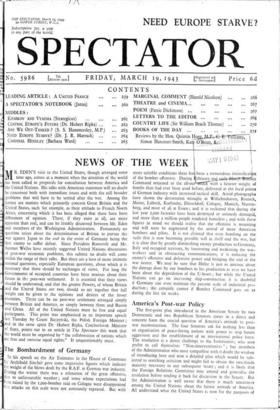NEWS OF THE WEEK M R. EDEN'S visit to the United
States, though arranged some time ago, comes at a moment when the attention of the world has been called to proposals for consultation between America and the United Nations. His talks with American statesmen will no doubt be concerned both with immediate issues and with the still, broader problems that will have to be settled after the war. Among the former are matters which primarily concern Great Britain and the United States, such. for example, as their attitude to French North Africa, concerning which it has been alleged that there have been differences of opinion. These, if they exist at all, are more apparent than real, and can be frankly discussed between Mr. Eden and members of the Washington Administration. Fortunately no question arises about the determination of Britain to pursue the war against Japan to the end in the event of Germany being the first enemy to suffer defeat. Since President Roosevelt and Mr. Sumner Welles have recently suggested United Nations discussions of post-war economic problems, this subject no doubt will come within the range of their talks. But there are a host of more intimate national questions, especially European questions, about which it is necessary that there should be exchanges of views. For long the Governments of occupied countries have been anxious about their future in the post-war settlement. It is essential that their views should be understood, and that the greater Powers, of whom Britain and the United States are two, should so act together that full weight can be given to .the opinions and desires of the . lesser countries. There can be no post-war settlement arranged simply between Britain and America, or simply between them and Russia and China. All of the United Nations must be free and equal participants. This point was emphasised in an important speech last Tuesday by Count Raczynski, the Polish Foreign Minister ; and in the same spirit Dr. Hubert Ripka, Czechoslovak Minister of State, points out in an article in The Spectator this week that the world must be organised by " the collaboration of nations which are free and exercise equal rights." It unquestionably must.


























